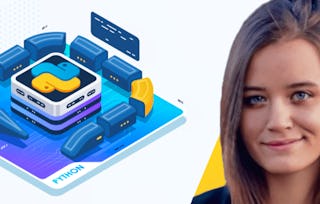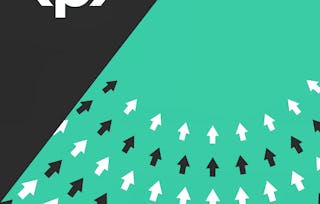Start your Python journey with this course, where you’ll gain a solid foundation in this powerful language. Learn how to work with variables and data types to store and process information, master operations to perform calculations and make comparisons, and unlock the power of strings for text manipulation. Through hands-on case studies, like creating a checkout system, splitting tips, and calculating compound interest, you’ll apply your skills to solve real-life problems. This beginner-friendly course is perfect for anyone looking to build practical coding skills and confidence in Python.
即将结束: 只需 199 美元(原价 399 美元)即可通过 Coursera Plus 学习新技能。立即节省

您将学到什么
Use Python programming fundamentals, including variables, data types, and basic input/output functions
Perform arithmetic, relational, and logical operations, and manipulate strings
Analyze and create Python programs to solve real-world problems
您将获得的技能
要了解的详细信息

添加到您的领英档案
6 项作业
了解顶级公司的员工如何掌握热门技能

积累特定领域的专业知识
- 向行业专家学习新概念
- 获得对主题或工具的基础理解
- 通过实践项目培养工作相关技能
- 获得可共享的职业证书

该课程共有6个模块
This module introduces the basics of Python, highlighting why it is a popular programming language and how to start learning it. It covers the differences between script and interactive Python, explains why iPython is preferred, and introduces Jupyter Notebooks as a powerful tool for coding. Additionally, it explores the distinctions between local and cloud-based coding environments, including the specific setup used in Coursera labs.
涵盖的内容
11篇阅读材料1个作业
This module explores the basics of input and output in Python. Starting with the classic "Hello, World!" example using the print() function, it explains the differences between single, double, and triple quotation marks in Python. The module also covers how to print multiple values simultaneously and introduces the input() function to receive user inputs. Learners will see how to combine input() and print() to create simple interactive programs.
涵盖的内容
1篇阅读材料1个作业6个非评分实验室
This module introduces variables in Python, including how to define them and the rules for naming them correctly according to syntax and conventions. It covers the fundamental data types—integers (int), floating-point numbers (float), and strings (str)—and explains how to convert between these types using Python’s built-in conversion functions.
涵盖的内容
5篇阅读材料2个作业2个非评分实验室
This module focuses on the different types of operations in Python, including assignment, arithmetic, relational, and logical operations. It explains how to use these operations to manipulate data and make comparisons within Python programs, providing a foundational understanding of how data is processed and evaluated.
涵盖的内容
1篇阅读材料1个作业4个非评分实验室
This module delves into the str data type in Python, covering everything from the basics of what a string is to how to create, access, and manipulate strings. It includes techniques for slicing, concatenating, and formatting strings, as well as an overview of common string methods that simplify text processing tasks.
涵盖的内容
2篇阅读材料1个作业6个非评分实验室
This module applies essential Python concepts through practical case studies, demonstrating how to solve real-life problems using the skills learned in previous modules. The case studies include a checkout system for calculating total costs, a tip-splitting application to fairly divide tips among diners, and a compound interest calculator for financial planning.
涵盖的内容
1篇阅读材料3个非评分实验室
获得职业证书
将此证书添加到您的 LinkedIn 个人资料、简历或履历中。在社交媒体和绩效考核中分享。
位教师

从 Data Analysis 浏览更多内容
 状态:免费试用
状态:免费试用KodeKloud
 状态:免费试用
状态:免费试用University of Colorado Boulder
 状态:免费试用
状态:免费试用
人们为什么选择 Coursera 来帮助自己实现职业发展




常见问题
To access the course materials, assignments and to earn a Certificate, you will need to purchase the Certificate experience when you enroll in a course. You can try a Free Trial instead, or apply for Financial Aid. The course may offer 'Full Course, No Certificate' instead. This option lets you see all course materials, submit required assessments, and get a final grade. This also means that you will not be able to purchase a Certificate experience.
When you enroll in the course, you get access to all of the courses in the Specialization, and you earn a certificate when you complete the work. Your electronic Certificate will be added to your Accomplishments page - from there, you can print your Certificate or add it to your LinkedIn profile.
Yes. In select learning programs, you can apply for financial aid or a scholarship if you can’t afford the enrollment fee. If fin aid or scholarship is available for your learning program selection, you’ll find a link to apply on the description page.
更多问题
提供助学金,







